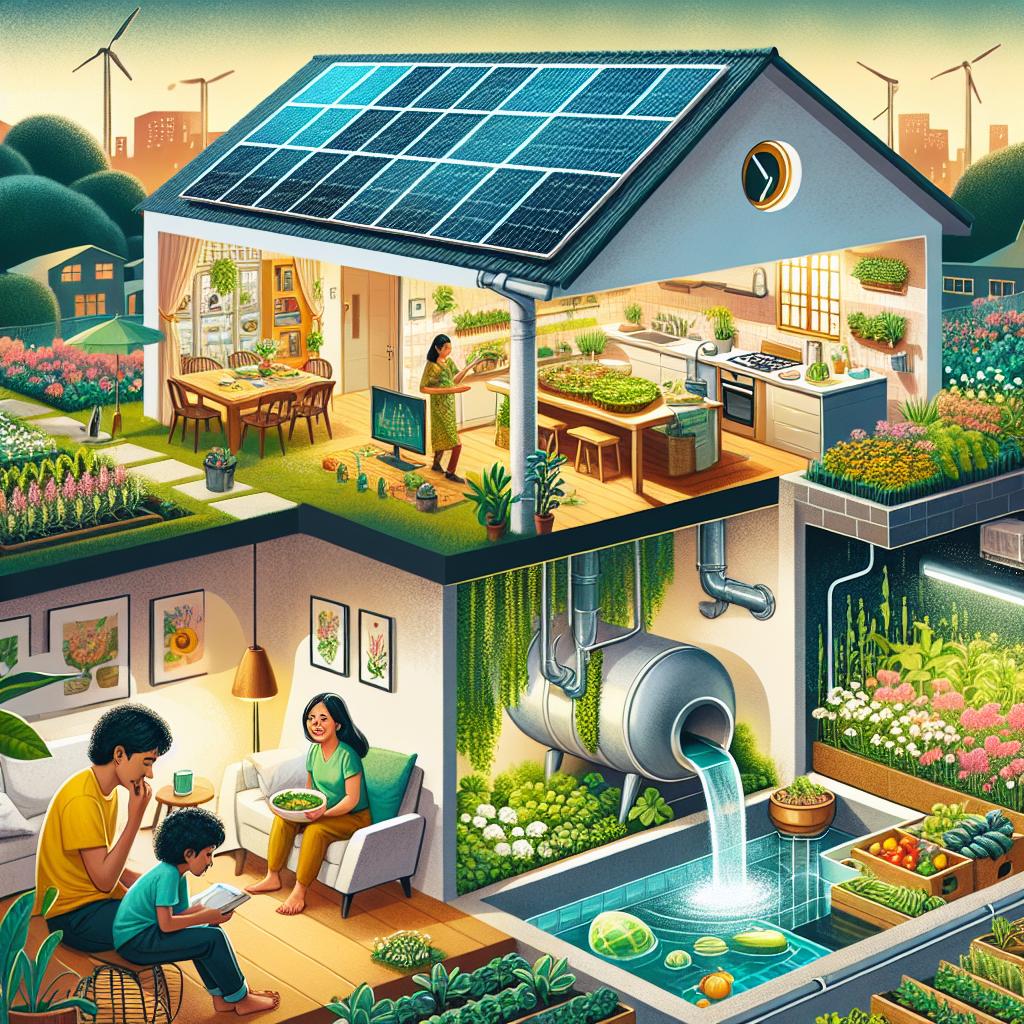In a world where energy consumption shapes our daily lives, making mindful choices has never been more important. Picture this: a cozy evening at home, the soft glow of your favorite reading lamp, the hum of your refrigerator gently blending into the background. Now, imagine if these everyday essentials could be both kind to your wallet and the Earth! Welcome to the realm of energy-efficient home appliances—a delightful fusion of innovation and sustainability. In this article, we’ll explore how outfitting your home with these remarkable gadgets can lead to significant savings on your energy bills while also treading lightly on our precious planet. So, whether you’re a seasoned eco-warrior or just starting your green journey, let’s embark on this enlightening adventure together!
Embracing Eco-Friendly Choices for a Greener Home
Making the shift to energy-efficient home appliances is a simple yet powerful way to reduce your carbon footprint and promote sustainability. By investing in Energy Star certified products, you not only cut down on energy consumption but also save on monthly utility bills. Here are some common appliances that can benefit from an energy-efficient upgrade:
- Refrigerators – Modern models use up to 50% less energy than traditional refrigerators.
- Washing machines - Energy-efficient washers can save up to 30% more water than conventional machines.
- Dishwashers – Newer dishwashers require less water and energy to get the job done.
- Heating and cooling systems – Smart thermostats can adjust your HVAC system based on your routine.
Consider the immediate benefits as well. Choosing these appliances can significantly lower your household’s energy demands and lead to a cleaner environment. To give you an idea of the potential savings, we’ve compiled a simple comparison of common appliances:
| Appliance Type | Energy Consumption (kWh/year) | Typical Cost Savings |
|---|---|---|
| Standard Refrigerator | 500-800 | Up to $200 |
| Conventional Washer | 350-800 | Up to $150 |
| Old Dishwasher | 300-700 | Up to $120 |
| Standard HVAC System | 2000-4000 | Up to $300 |
Smart Shopping Tips for Energy-Efficient Appliances
When shopping for energy-efficient appliances, it’s essential to keep in mind a few key factors to maximize your savings while minimizing your environmental impact. Start by looking for Energy Star certifications, which signify that the appliance meets strict energy efficiency guidelines set by the U.S. Environmental Protection Agency. Additionally, you should compare energy consumption ratings and the estimated annual operating costs of different models. Don’t forget to consider the size and features of each appliance; sometimes, a slightly larger or more advanced model can offer better efficiency despite a higher initial price.
Before making a final purchase, check if any local or federal incentives are available that can help offset the cost of an energy-efficient appliance. Many utility companies also offer rebates to encourage customers to switch to greener options. To help you make informed decisions, here’s a simple comparison table of popular appliances and their average energy consumption:
| Appliance Type | Annual Energy Use (kWh) | Estimated Cost (based on $0.12/kWh) |
|---|---|---|
| Refrigerator | 400-600 | $48-$72 |
| Washing Machine | 300-600 | $36-$72 |
| Dishwasher | 270-500 | $32.40-$60 |
Lastly, consider the lifespan of the appliance. Investing in a high-quality, durable model can save you money over time, even if the upfront cost is higher. As a bonus, take advantage of seasonal sales events when implementing your shopping strategy. You’ll find discounts on products that will not only fit your lifestyle but also promote sustainability and contribute to a greener planet.

The Hidden Benefits of Going Green: Save Money and Energy
Making the switch to energy-efficient home appliances can significantly slash your utility bills while doing a solid favor for the environment. Energy Star-rated products, for instance, utilize advanced technology to use less energy without sacrificing performance. When you replace a traditional refrigerator, for example, with a newer model that meets energy efficiency standards, you can save up to 50% on energy consumption. That’s money back in your pocket every month! Not to mention, many governments offer rebates or tax incentives for purchasing these eco-friendly appliances, providing a welcome bonus to your savings.
Beyond the immediate savings on bills, energy-efficient appliances often come with improved functionality and durability. Many of these products are designed with innovative features that enhance user experience while minimizing environmental impact. Consider the following benefits:
- Longer Lifespan: Many energy-efficient appliances are built to last, reducing the need for frequent replacements.
- Lower Maintenance Costs: They typically require fewer repairs, saving you even more in the long run.
- Eco-Friendly Materials: Many are constructed from sustainable materials, further contributing to a healthier planet.
Investing in energy-efficient home appliances ensures you’re not just saving money and energy, but you are also consciously contributing to a sustainable future. Making mindful choices in your household can create a profound impact, showcasing that going green is not only beneficial but also incredibly rewarding.

Creating a Sustainable Home Environment with Ease
Transforming your living space into a sanctuary of sustainability doesn’t have to be daunting. One of the most effective ways to start is by upgrading to energy-efficient home appliances. These modern marvels not only reduce your carbon footprint but also significantly lower your monthly utility bills. Imagine the relief in watching your energy costs shrink while contributing to a healthier planet! To make the transition smoother, consider investing in appliances that boast the ENERGY STAR® label, ensuring you’re choosing options that meet strict energy efficiency guidelines. Some popular categories to look into include:
- Refrigerators: Look for models with improved insulation and design that keeps temperature fluctuations to a minimum.
- Washing Machines: High-efficiency washers use less water and energy while delivering the same (if not better) cleaning power.
- Dishwashers: Select models that sense how dirty the dishes are and adjust their water use accordingly.
- LED Lighting: Not an appliance per se, but switching to LED light bulbs can significantly cut energy consumption.
To further help visualize the savings from energy-efficient appliances, here’s a simple comparison of annual energy usage:
| Appliance Type | Traditional (kWh/year) | Energy-Efficient (kWh/year) | Annual Savings (kWh) |
|---|---|---|---|
| Refrigerator | 800 | 400 | 400 |
| Washing Machine | 500 | 300 | 200 |
| Dishwasher | 350 | 280 | 70 |
By replacing outdated appliances with energy-efficient alternatives, you not only lighten your environmental impact but also foster a home that exemplifies economic mindfulness. Small changes today can lead to significant benefits for both your wallet and the Earth.
Q&A
Q&A on Energy-Efficient Home Appliances: Save Money and the Planet
Q: What are energy-efficient home appliances?
A: Great question! Energy-efficient home appliances are designed to use less energy than standard models, helping you save both on your electricity bill and reduce your carbon footprint. They often have an Energy Star rating, which means they meet strict energy efficiency guidelines set by the U.S. Environmental Protection Agency.
Q: Why should I consider upgrading to energy-efficient appliances?
A: Who wouldn’t want to save money? Upgrading to energy-efficient appliances can significantly lower your energy bills over time. Plus, they typically perform better, meaning they work more effectively without running up your energy consumption. It’s a win-win for your wallet and the planet!
Q: How do I know which appliances are energy-efficient?
A: Look for the Energy Star label—it’s like a badge of honor for appliances that save energy. You can also compare the energy consumption on the appliance’s yellow EnergyGuide label, which provides a clear idea of how it stacks up against others.
Q: Are energy-efficient appliances more expensive?
A: Initially, they might have a higher price tag, but think of it as an investment rather than a cost. Lower operating costs can save you hundreds over the lifetime of the appliance. Plus, there are often local rebates and incentives to sweeten the deal!
Q: What are some examples of energy-efficient appliances I should consider?
A: From refrigerators and washing machines to dishwashers and water heaters, you have plenty of options! Even small things like LED light bulbs and smart thermostats can contribute to your energy-saving journey.
Q: Can I really make a difference by switching to energy-efficient appliances?
A: Absolutely! Each energy-efficient appliance you choose helps reduce demand on power plants, which in turn cuts down greenhouse gas emissions. Collectively, if everyone shifts towards more sustainable choices, we can make a significant positive impact on our environment.
Q: What are some tips for using energy-efficient appliances effectively?
A: Start by reading the manual! Many energy-efficient appliances have specific settings that optimize performance and reduce energy use. Also, consider running your dishwasher and laundry during off-peak hours to further lower costs and lessen the strain on the grid.
Q: Will my home feel less comfortable if I switch to energy-efficient appliances?
A: Not at all! In fact, many energy-efficient appliances offer enhanced features that improve comfort—like more precise temperature controls in energy-efficient refrigerators or better humidity control in washers. You’ll likely be enjoying both efficiency and comfort in your home!
Q: What other benefits come with energy-efficient appliances beyond saving money?
A: You’ll enjoy a quieter home, as many energy-efficient appliances operate with reduced noise levels. Plus, they often come with advanced technology that enhances user experience. And let’s not forget the satisfaction of doing your part to help our planet and future generations!
Q: What’s the first step I should take if I’m ready to make the switch?
A: Begin by assessing your current appliances and identifying which ones are due for an upgrade. Research options, visit stores to compare models, and consider consulting with a professional who can help you choose the best solutions for your home. Happy energy-saving!
Whether you’re a seasoned eco-warrior or a newbie to energy efficiency, embracing energy-efficient home appliances is a fantastic way to make a difference—one appliance at a time! 🌍✨
In Summary
As we wrap up our journey through the world of energy-efficient home appliances, it’s clear that making mindful choices can powerfully impact both our wallets and the planet. By opting for these eco-friendly alternatives, you’re not just investing in modern convenience – you’re joining a community of conscious consumers dedicated to sustainability.
Imagine the joy of opening your energy bill and seeing those savings add up, all while knowing you’re treading lightly on Mother Earth. From refrigerators that sip electricity to washing machines that dance with efficiency, each energy-efficient appliance is a step towards a greener, brighter future.
So, as you consider your next home upgrade, remember: every small change counts. Let’s celebrate the simple yet profound act of choosing wisely, nurturing our environment while fostering our finances. Here’s to smart shopping, sustainability, and a harmonious home – together, we can create a ripple effect of positive change. Happy eco-friendly living! 🌍💡

